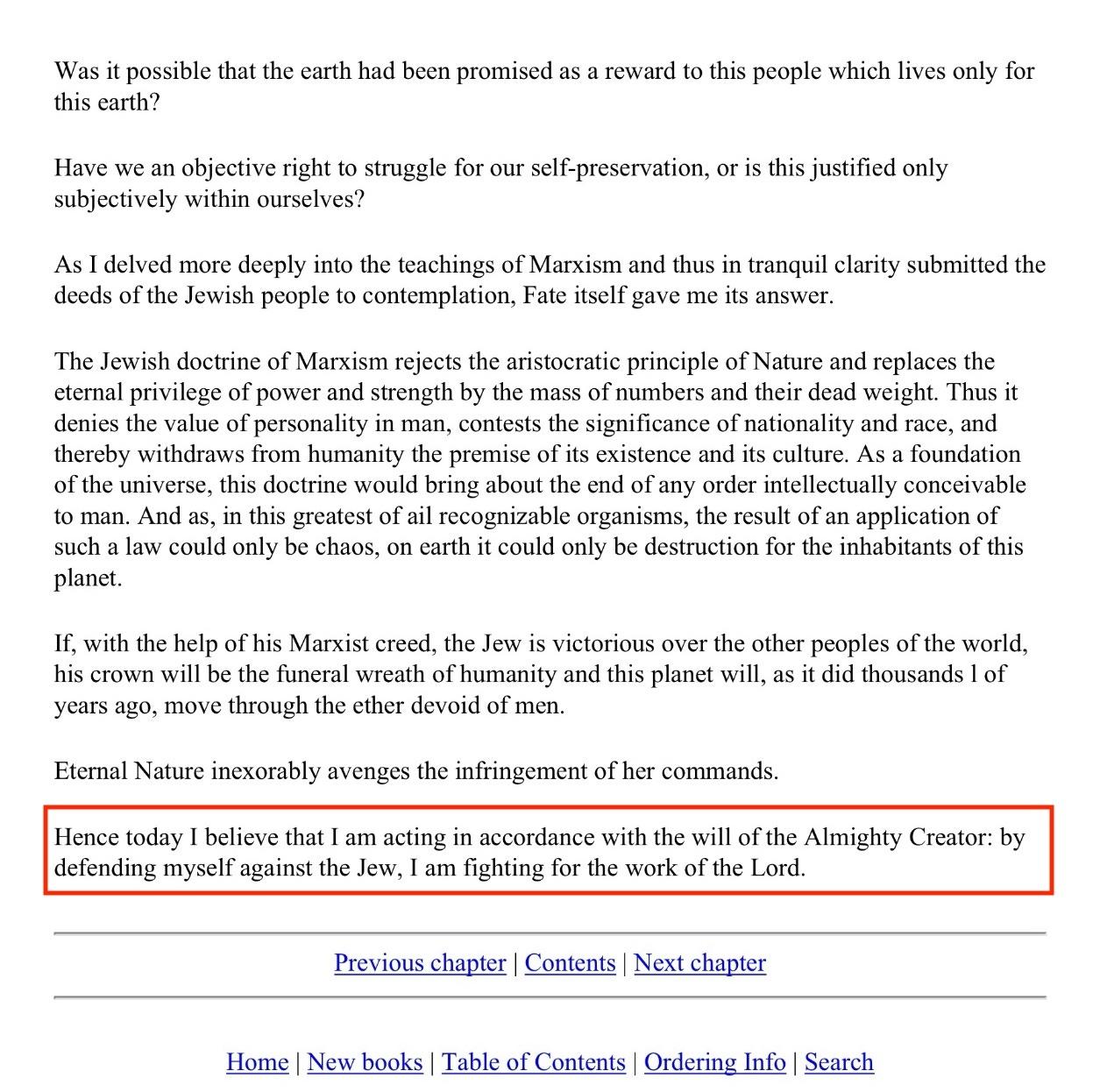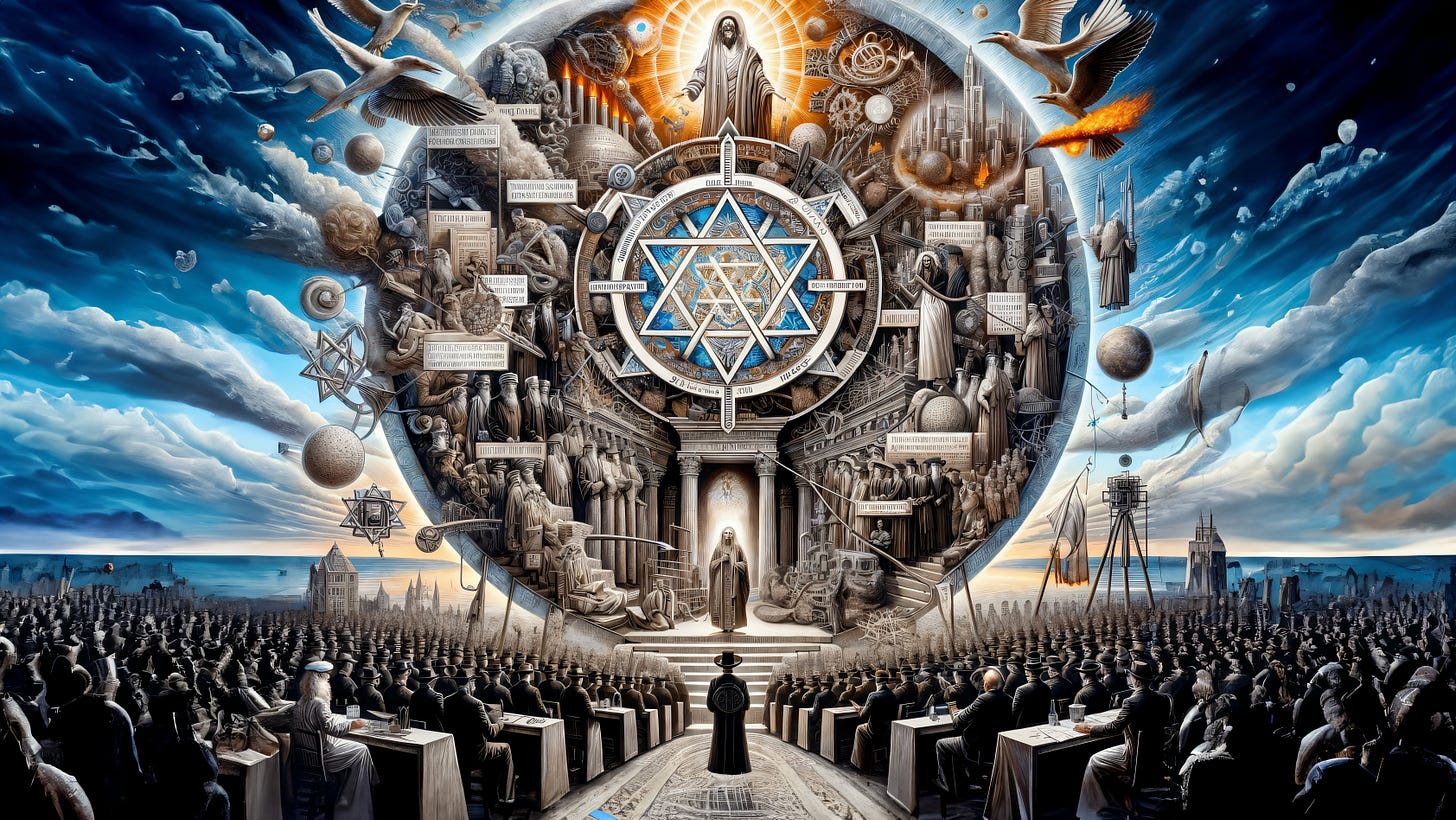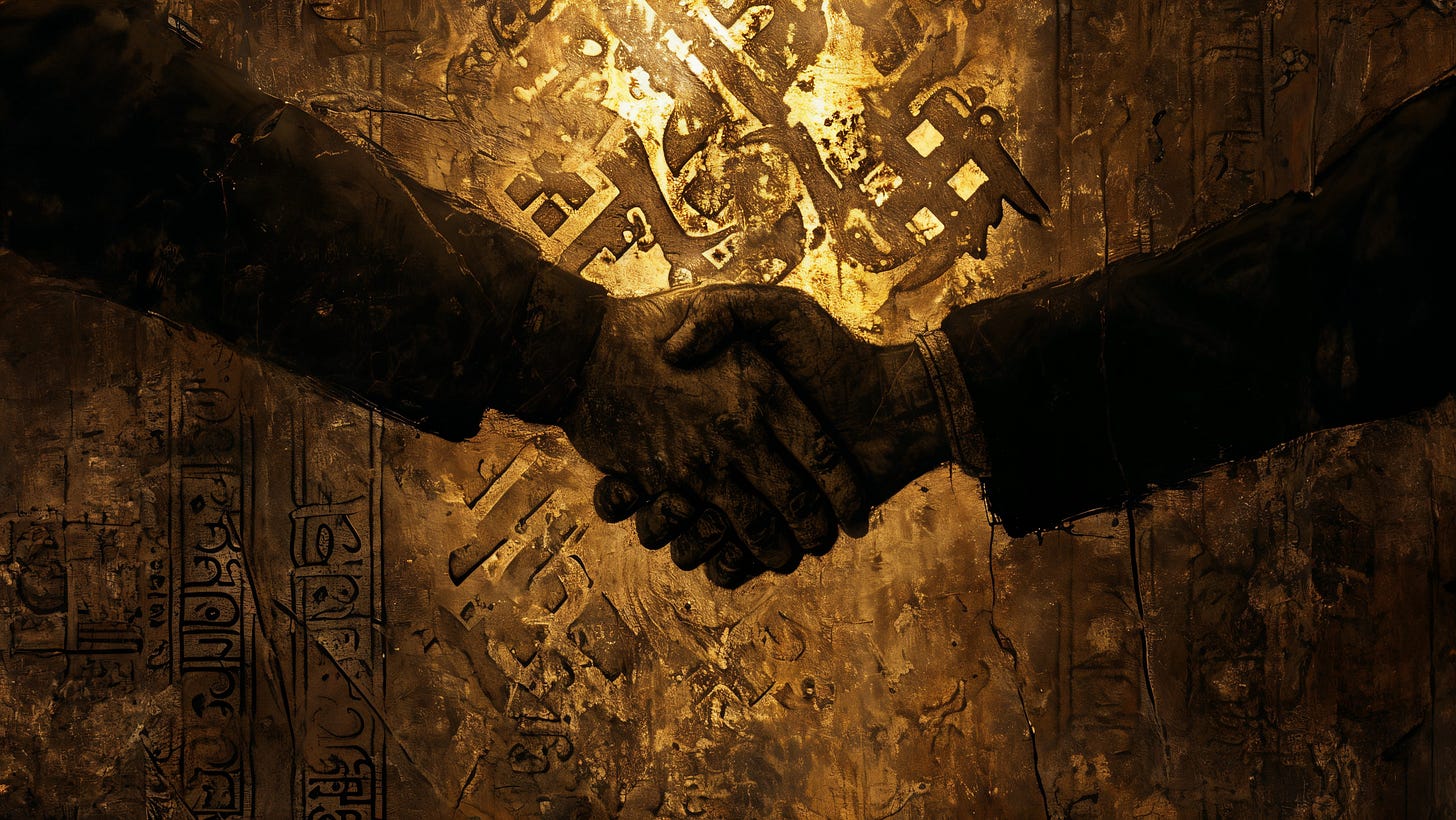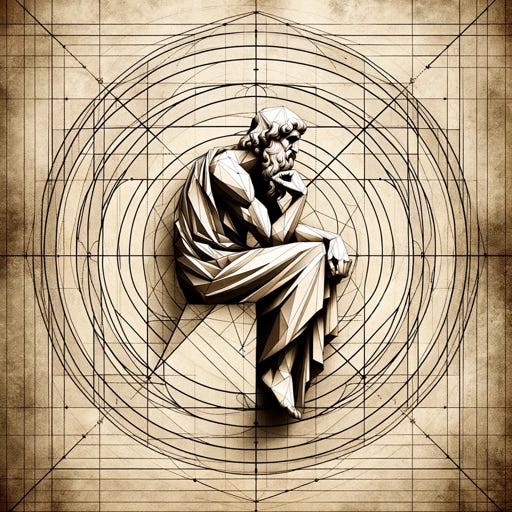The Unspoken Firmware: Religion’s Enduring Legacy of Violence
Critiquing the 'Chosen Darkness' and 'Divine Tragedy': Religion's Role in World Wars and Its Impact on Nazi Ideology, Challenging Sanctified Narratives
Lately, I have been doing a lot of reading, primarily for research purposes. I have been diving into the depths of history, piecing together essays that challenge our understanding of human civilization. However, a nagging question has been lingering in my mind.
I've engaged in online communities dedicated to atheism, politics, and social issues for over two decades. Throughout this journey, a peculiar observation has stood out: the commonly accepted narrative of Hitler's rise to genocidal infamy seemed overly simplified and almost sanitized. This prevailing depiction of history, often found in textbooks and mainstream discussions, paints a picture of a man who spontaneously spiralled into genocide, rallying a nation to his cause and, plunging the world into a world war and committing the Holocaust. But such a narrative, I realized, omits critical context and leaves gaping holes in our understanding of the past.
In my quest to uncover the complex web of historical events that shaped the cataclysmic World Wars, I realized that the journey to understanding requires delving deeply into a multitude of perspectives and narratives. Recognizing the daunting challenge this poses for anyone eager to embark on a similar exploration, I have curated the following list of books. This selection is not just a compilation of texts; it represents a significant achievement in itself, connecting disparate dots to form a coherent picture of the past. These books are invaluable resources for those eager to dive deeper beyond this essay.
However, navigating through such an extensive array of literature can be overwhelming. To streamline this process and make it more accessible, I employed an innovative approach: integrating these books into an AI knowledge base. This strategy transforms the way we engage with historical texts. Imagine having these books not just sit idly on a shelf but actively converse with you, responding to your queries and shedding light on intricate historical intricacies—as if the books themselves could speak.
Consider incorporating this method into your research endeavours and experience how it brings these authoritative texts to life, making your journey through history both enlightening and efficient. To achieve this, I utilized Dante.ai. Alternatively, if you prefer to have the books read to you while you follow along, I use Speechify for that purpose.
"The Rise and Fall of the Third Reich" by William L. Shirer (Published: 1960) - Shirer, an American journalist, presents a comprehensive history of Nazi Germany. Grounded in firsthand observation and extensive research, his work offers a detailed account of the Nazi regime, its ideologies, and the war it waged. Shirer's journalistic rigour captures the chronological progression of the Third Reich, providing a detailed narrative that exposes the mechanisms of Nazi propaganda, the manipulation of a nation, and the path to genocide. His observations provide fundamental knowledge of how religious and nationalist fervour can be exploited by totalitarian regimes, offering an essential understanding for analyzing similar patterns in current global dynamics.
"The Myth of the Twentieth Century" by Alfred Rosenberg (Published: 1930) - As a key Nazi ideologue, Rosenberg's work is essential for understanding the ideological underpinnings of Nazism. It sheds light on the racial theories and reinterpretation of Germanic history that formed the basis of Nazi ideology rather than a Jewish or victim-centric perspective. By exploring Rosenberg's writings, one can gain insight into the blend of mysticism, racial purity theories, and history that characterized Nazi philosophy. These perspectives also highlight how religious and racial narratives can be distorted to justify extreme ideologies and policies, reflecting the religious undercurrents present in current nationalistic movements.
"Inside the Third Reich" by Albert Speer (Published: 1969) - Speer, who served as Hitler's chief architect and later as Minister of Armaments and War Production for the Third Reich, offers insights into the internal workings of the Nazi leadership. His memoir provides a unique perspective from within the regime itself, shedding light on the interplay between personal ambition and ideological fanaticism. Speer's account serves as a cautionary tale, illustrating how political systems can be corrupted by radical ideologies, which remains relevant in understanding modern authoritarian tendencies.
"Hitler: A Study in Tyranny" by Alan Bullock (Published: 1952) - This biography of Adolf Hitler, written by British historian Alan Bullock, offers a detailed examination of Hitler's life, his rise to power, and the nature of his dictatorship. It provides a comprehensive look at Hitler's personal and political evolution. Bullock's analytical biography dissects Hitler's manipulative charisma and strategic ruthlessness. By understanding Hitler's psychological profile and his use of religious symbolism in political propaganda, the book provides a nuanced perspective on the dangers of charismatic leaders who exploit religious sentiments for political gain.
"The Wages of Destruction: The Making and Breaking of the Nazi Economy" by Adam Tooze (Published: 2006) - In this book, economic historian Adam Tooze provides an analysis of the Nazi economy. He explores how Hitler's ideological goals, such as territorial expansion and racial policy, were closely connected to the regime's economic strategies. Through his economic analysis, Tooze reveals the damaging consequences that can arise when ideological obsessions, like racial purity and territorial expansion, intersect with national economic policies. This examination of the intersection between ideology and economy offers insights into current global economic tensions influenced by nationalist agendas.
"Ordinary Men: Reserve Police Battalion 101 and the Final Solution in Poland" by Christopher R. Browning (Published: 1992) - Browning's work focuses on a police unit composed of ordinary German men and their involvement in the Holocaust in Poland. It provides an analysis of how regular citizens became perpetrators in the Holocaust, shedding light on the wider societal complicity in Nazi crimes. Browning's exploration of how average individuals can commit extraordinary atrocities serves as a chilling reminder of the human capacity for cruelty when influenced by ideological propaganda. This book is essential for comprehending the psychological mechanisms that can lead to widespread participation in crimes against humanity.
"The Jewish State" by Theodor Herzl (Published: 1896) - This foundational text of Zionism presents Herzl's vision for a Jewish state. It reflects the aspirations and political mobilization of Jews seeking a national homeland, contributing to European tensions. In "The Jewish State," Theodor Herzl advocates for a Jewish homeland as a response to anti-Semitism. The text highlights the tendency for societies to address societal issues through religiously homogenized states, perpetuating segregation based on religious identity instead of fostering inclusive, secular societies. Herzl's seminal work on Zionism presents the ideological roots of the Jewish nationalist movement, providing historical context to the long-standing conflicts in the Middle East. Understanding these origins is critical to comprehending the current geopolitical tensions and the role of religious nationalism in global politics.
"The Iron Wall" by Vladimir Jabotinsky (Published: 1923) - Jabotinsky was a leader of the Zionist Revisionist movement. In this text, he outlines his belief in the necessity of a strong Jewish military force to establish and maintain a Jewish state. This reflects a more militant approach to Zionism. The book endorses a militant Zionist stance, using religious identity to justify aggressive nationalism. It demonstrates how religious narratives can contribute to divisive and exclusionary political strategies. Jabotinsky's advocacy for a militant approach to Zionism highlights the diverse ideological strands within Zionism and their impact on the Arab-Israeli conflict. This text is crucial in understanding the intersection of religious identity and political strategy in ongoing regional disputes.
"Two Hundred Years Together" by Aleksandr Solzhenitsyn (Published: 2001-2002) - This two-volume historical essay examines the relationship and understanding between Russians and Jews in Russia, including the revolutionary period. Despite being a controversial work, Solzhenitsyn delves into the intricate involvement of Jews in social and political movements in Russia and its impact on societal perceptions. Through this historical exploration, Solzhenitsyn reveals how religious identities often play a central role in societal and political conflicts, leading to enduring divisions and hostilities. Solzhenitsyn's examination of the complex relationship between Russians and Jews provides a historical perspective on ethnic and religious tensions in Eastern Europe. His narrative helps us understand how historical grievances and religious differences can fuel long-standing societal conflicts.
"The Controversy of Zion" by Douglas Reed (Published: 1956) - Reed's work explores the history of Zionism and its influence on global politics. The book has sparked controversy as it delves into the political aspects of Jewish theology and its impact on international relations. In this book, Reed provides a detailed examination of Zionism's historical trajectory and its significant global implications. It highlights the influential role that religious motivations can play in shaping political movements, often surpassing rational and human-centred approaches to international relations. Reed's provocative exploration of the impact of Zionism on global politics offers a critical perspective on how religious motivations can shape international relations. This book is essential for anyone seeking to understand the complex connections between religious movements and global power dynamics.
"Jewish Power: Inside the American Jewish Establishment" by J.J. Goldberg (Published: 1996) - This book offers an insider's perspective on the influence and power of Jewish organizations in America. While primarily focusing on the American context, it also explores the broader implications of Jewish activism and its global impact. J.J. Goldberg examines the role of religious communities in shaping political spheres within the United States. The book serves as a case study, demonstrating how dynamics within religious groups can extend to broader power struggles, influencing policies and shaping national narratives. Goldberg's analysis of the influence of Jewish organizations in the U.S. provides a valuable case study on how religious communities can wield significant political power. This book is a valuable resource for understanding the dynamics of religious lobbying and its impact on domestic and foreign policy.
"Germany Must Perish" by Theodore N. Kaufman (Published: 1941) - Theodore N. Kaufman's controversial book advocates for the extreme measure of sterilizing the German population to prevent future wars. This radical proposition highlights the potential for religious and ethnic tensions to escalate into proposals for drastic and inhumane solutions devoid of rational and ethical considerations. Kaufman's radical proposal represents the extreme end of wartime propaganda and hate speech. This book serves as a striking example of how religious and ethnic hatred can lead to inhumane and unethical solutions, mirroring the dangerous rhetoric observed in modern extremist groups.
"Mein Kampf" by Adolf Hitler (Published: 1925, Volume 1; 1926, Volume 2) - Adolf Hitler's "Mein Kampf" is a notorious manifesto that outlines his ideology and future plans for Germany. The book, translated into "My Struggle," combines autobiographical elements with Hitler's political and racial beliefs, including his hatred for Jews and his belief in Aryan supremacy. It serves as a chilling example of how extremist ideologies can be deeply rooted in a mixture of personal grievances, distorted historical perspectives, and dangerous pseudo-scientific racial theories. The work often contains religious undertones and nationalistic fervour, revealing the destructive potential of fanaticism and the catastrophic consequences when such ideologies gain political influence. "Mein Kampf" remains a haunting reminder of the dangers of unchecked hatred and the importance of vigilance against ideologies that promote division and inhumanity. Hitler's manifesto is a crucial document for understanding the fusion of personal grievances, religious symbolism, and racial ideology that shaped his political agenda. Analyzing "Mein Kampf" is essential for recognizing the warning signs of extremist ideologies that employ religious and nationalistic elements to justify oppression and violence.
This reflection is not intended as a comprehensive analysis but rather as an exploration of a significant aspect often omitted from mainstream historical narratives: the religious underpinnings of the great World Wars. My deep dive into "Mein Kampf," particularly the final pages of Chapter 2, led to a pivotal realization. Within these pages of Hitler's manifesto, I uncovered revealing insights into the fusion of personal religious beliefs and nationalistic fervour. This discovery was crucial in supporting my thesis that Nazism, both in essence and practice, was an advanced form of Christianity characterized by a zealous belief in being chosen and destined for greatness.
In these passages, Hitler's ideological convictions demonstrate how religious beliefs, often masquerading as personal spirituality, were instrumental in orchestrating some of history's most devastating events. These convictions, far from being benign personal faith elements, acted as a foundational framework, propelling societies towards atrocities under the pretense of divine command and national destiny.
My extensive involvement in atheist discourse has consistently led me to challenge the sanitized versions of history that are commonly presented. These narratives often neglect the crucial role of religious belief in fueling historical atrocities, seemingly to protect the sanctity of faith from its own historical repercussions. This journey through history is more than an academic endeavour; it represents a quest to uncover hidden truths, address the gaps left by conventional narratives, and confront the intricate entanglement of religion, politics, and power that has profoundly influenced our world.
The Underlying Theological Tensions and Their Historical Manifestations
Between the lines of the texts explored, there's an undeniable thread: the theological concept of a chosen people and their supposed destiny to rule over others. This belief, deeply embedded in Jewish theology, has had far-reaching implications throughout history. The narrative of divine favouritism and a promised land, as outlined in texts like "The Jewish State" and "The Iron Wall," has not only shaped the course of Zionism but has also contributed to broader societal tensions.
The notion of chosenness, as seen in Jewish theology, posits a unique covenant with the God character of Abrahamic myth. This idea, while spiritually significant, has had tangible consequences in the political and social arenas. The belief in a preordained right to a homeland and the subsequent political mobilization around Zionism have contributed to significant tensions, both within Europe and in the broader global context. Works like "Two Hundred Years Together" and "The Controversy of Zion" delve into these complex dynamics, highlighting the role of religious identity in shaping historical and contemporary conflicts.
Furthermore, the Christian response to Jewish theological concepts has been historically marked by conflict and antagonism. The narrative of Jesus Christ's betrayal and crucifixion, often attributed to Jewish actions through the hands of Judas, has fueled centuries of anti-Semitic sentiment within Christian societies. This historical backdrop sets the stage for the deep-seated animosity that would later manifest in the horrors of the Holocaust. The idea that the Romans, as executioners of Christ, are absolved in Jewish theology further complicates this relationship, creating a theological paradox that has been exploited for political purposes.
This fraught history of theological tension and its translation into real-world conflicts and prejudices is a stark reminder of the power of religious narratives. The impact of these beliefs is not confined to the spiritual realm but spills over into politics, societal structures, and international relations. The often-overlooked or sanitized discussion of these aspects in mainstream narratives does a disservice to our understanding of history and current affairs.
As we reflect on these historical realities, it becomes clear that these theological underpinnings have played a significant role in shaping events like the World Wars and the rise of Nazi ideology. The sanitized versions of history, which often omit the influence of religious belief in driving atrocities, fail to acknowledge the full spectrum of factors that have shaped our world. In doing so, we risk repeating the mistakes of the past, overlooking the lessons that history has to offer.
This examination is not just an academic pursuit but a necessary step in fostering honest, open conversations about our collective history. By acknowledging the influence of religious ideologies and their often destructive outcomes, we can better understand the motivations and actions of historical figures and movements. It's a call to move beyond public relations jargon and face the uncomfortable truths that have shaped our societies. Only by confronting these realities head-on can we hope to build a more informed, nuanced, and ultimately more just and equitable world.
Hitler's Ideological Convictions: The Fusion of Religion and Nationalism
In examining the rise of Adolf Hitler and the Nazi regime, we encounter a disturbing amalgamation of religious doctrine and political ambition. This fusion, far from being a peripheral aspect of Hitler's ideology, was central to his vision as outlined in 'Mein Kampf.' Here, a deep-seated intertwining of personal religious beliefs with fervent nationalism comes to the fore, providing a stark insight into the undercurrents that fuelled one of history's most catastrophic epochs.
The pages of Hitler's manifesto, 'Mein Kampf,' reveal the profound influence of religious belief in shaping his worldview and, by extension, the trajectory of human history. These passages illustrate how religious convictions, often portrayed as personal spirituality, were harnessed to justify catastrophic actions on a global scale. Far from being mere elements of personal faith, these beliefs functioned as a foundational framework, programming the Nazi movement for atrocities justified under the guise of divine will and national destiny.
Hitler's references to Christianity in 'Mein Kampf' are not merely symbolic or superficial; they are deeply woven into the fabric of his ideological stance. He often invoked Christian imagery and rhetoric, positioning himself and the Nazi movement within a Christian narrative of struggle and salvation. Hitler's speeches and writings are replete with allusions to Biblical themes and Christian symbolism, portraying his mission as a crusade against perceived evils and positioning the Aryan race as a chosen people in a divinely sanctioned struggle.
This blending of Christian themes with extreme nationalism and racial ideology is not a unique phenomenon to Hitler or the Nazi regime. Throughout history, religious narratives, particularly within Christianity, have been manipulated to endorse political and military endeavours, often with devastating consequences. In the context of Nazi Germany, Christianity was used as a legitimizing force, providing a moral and spiritual rationale for policies of exclusion, persecution, and ultimately genocide.
Furthermore, the Nazi regime actively sought to co-opt Christian institutions and leaders, aligning the church with the state's objectives. The Reichskirche (State Church) and movements like the German Christians sought to merge Christian doctrine with Nazi ideology, emphasizing obedience to the state and the Führer as a religious duty. This state-sanctioned version of Christianity played a crucial role in garnering public support and suppressing dissent within the religious community.
The use of Christian themes in Nazi propaganda was strategic and pervasive. Religious symbols like the cross were employed alongside swastikas, and Christian holidays were reinterpreted to align with Nazi ideology. This strategic co-opting of religious symbolism and language helped to embed Nazi ideology within the cultural and spiritual landscape of Germany, making it more palatable to a predominantly Christian population.
In examining Hitler's use of Christian rhetoric and symbolism, it becomes clear that his ideology was not merely a political or racial doctrine but was deeply entwined with religious elements. This fusion of religion and nationalism under Hitler's regime offers a chilling example of how religious beliefs can be applied to serve destructive political ends. It underscores the need for a critical examination of how religious narratives are employed in political discourse and the dangers of allowing such narratives to go unchallenged.
As we reflect on this dark chapter of history, the lessons are clear: the manifestation of religious beliefs for political purposes can lead to catastrophic outcomes. It is a stark reminder of the need to maintain a vigilant separation between religious doctrine and state policy and to critically examine the use of religious rhetoric in the political arena. In doing so, we can work towards a society that values rational discourse and ethical principles over dogmatic allegiance to religious or nationalist ideologies.
Islamic Alliance with the Nazis is a Convergence of Shared Hostilities
Following the exploration of Hitler's Christianity-influenced ideology in "Mein Kampf," it is crucial to examine another, often overlooked, aspect of the Nazi regime's alliances during World War II. This facet involves the collaboration between certain Islamic factions and the Nazis, a convergence that further complicates the historical narrative of religious ideologies in the context of global conflict.
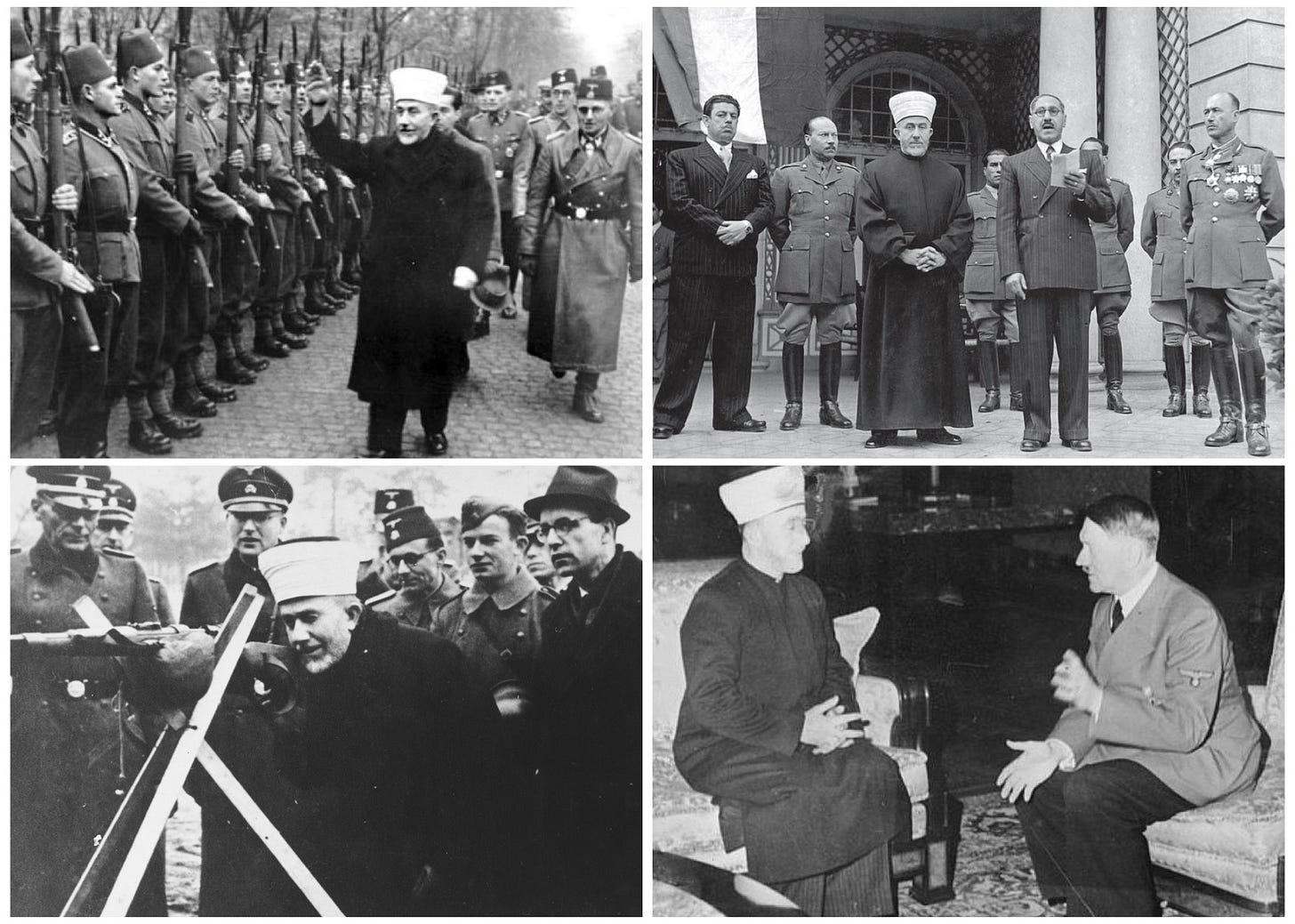
The alliance between some Islamic leaders and the Nazi regime was driven by a shared hostility towards Jews, rooted in both religious and geopolitical motivations. Historical documentation and photographs from the era reveal meetings between Adolf Hitler and prominent Islamic leaders, symbolizing this unexpected yet strategically significant alliance.
Islamic texts, including the Quran and Hadith, contain passages that are overtly hostile towards Jews. During the war, these views were applied to forge a common ground between the Nazis and Islamic groups. The Quran and Hadith's teachings were used not only as spiritual guidance but also as political tools, moulding public opinion and justifying the alliance.
This alignment brought to the forefront the darker aspects of religious scripture interpretation. It highlights how religious teachings when taken to their obvious conclusions, fuel hatred and justify political alliances that would otherwise seem incongruous.
Central to this alliance was the goal of combating perceived Jewish influence, both in Europe and the Middle East. The Nazis, driven by their anti-Semitic ideology, found a willing partner in Islamic factions who saw an opportunity to gain political leverage and counter Jewish aspirations, particularly in the context of the burgeoning Zionist movement.
For the Jewish community, this alliance was catastrophic. It meant facing hostility from multiple fronts, exacerbating their peril during the Holocaust. The Islamic-Nazi alliance not only fuelled the Nazis' genocidal campaign but also contributed to a broader environment of intolerance and persecution that the Jews faced.
The Islamic alliance with the Nazis remains a controversial and sensitive topic. It challenges simplistic narratives of World War II and highlights the complex interplay of religion, politics, and ideology. This chapter in history serves as a poignant reminder of the destructive potential when religious hostilities intertwine with political ambitions.
Reflecting on this alliance underscores the urgent need for nuanced understanding and critical examination of religious texts and historical alliances. It also reinforces the importance of confronting uncomfortable truths, learning from history, and striving towards a world where religious differences do not become pretexts for conflict and persecution.
The Legacy of Divine Favouritism: Historical Application of Sacred Texts
When examining the core texts of major religions—such as the Bible, the Torah, and the Quran—it becomes evident that these texts, in their literal and traditional interpretations, have been foundational in shaping centuries of conflict and division. Far from mere misinterpretations or distortions, these texts have often been followed to their literal conclusions, leading to significant historical and ongoing turmoil.
The narrative of a chosen people, as prominently featured in the Jewish religious texts, has been a direct catalyst for an array of conflicts and atrocities. This theme of divine favouritism and the concept of a promised land and a destiny to rule over others have been taken as divine mandates, justifying actions ranging from colonization and ethnic cleansing to wars waged under the banner of religious righteousness. The historical record shows a consistent pattern where these so-called sacred texts have been used as direct justifications for actions that have led to widespread suffering and injustice. These are not instances of scriptures being twisted to fit political agendas; rather, they are examples of the scriptures being applied in their most traditional and orthodox interpretations—applied in their most unvarnished form.
The impact of these religious doctrines has been profound and damaging. They have fostered an 'us versus them' mentality, legitimizing the oppression and subjugation of those deemed 'other' or outside the chosen group. This has perpetuated cycles of violence, persecution, and systemic discrimination, often sanctioned by religious authorities.
In many parts of the world, the conflation of religious doctrine with state power has led to theocratic governance systems, where religious law supersedes civil law, often at the expense of human rights and individual freedoms. In these contexts, dissent is not only political but also religious heresy, leading to severe punishments and social ostracism.
Moreover, the moral absolutism derived from these texts has often stifled critical thinking and scientific progress. By promoting a worldview that is anchored in unchangeable divine decrees, these religions have impeded societal evolution, holding back advancements in areas like science, reason, logic, physics, biology, evolution, freedom of expression and other key fields.
This dogmatic adherence to ancient scriptures has frequently led to the outright rejection or suppression of scientific discoveries and rational thought that contradict religious teachings. History is replete with examples where religious institutions have persecuted scientists and thinkers for proposing theories and ideas that challenged the religious orthodoxy.
The resistance to evolutionary biology, the denial of astronomical facts, the suppression of medical advancements under religious pretexts, and the censorship of artistic and literary works are just a few instances where religious dogmatism has directly conflicted with intellectual and scientific progress. Additionally, historical records have often been obscured or altered to hide the atrocities committed in the name of religion. These deliberate distortions not only conceal the true extent of the damage caused by religious conflicts but also impede our collective understanding of the past, hindering efforts to learn from historical lessons and work towards a more enlightened and inclusive future.
Literal interpretations of religious texts often result in regressive outcomes, driving actions and policies that hinder scientific and societal progress. Attempts to align their interpretations with modern sensibilities often fail due to their inherent dogmatism. This stark contrast with the ideals of humanism and rational, evidence-based thinking underscores the urgent need to reduce the influence of these texts in shaping societal norms and policies. Instead, we should promote a society guided by reason, scientific inquiry, and humanistic values.
These religions shape societies with archaic and dogmatic worldviews, stifling progress in pivotal areas such as education and rational inquiry. This approach directly conflicts with critical thinking and evidence-based reasoning principles, undermining humanism and societal advancement. Clerical attempts to nuance these texts have limited influence in preventing their literal application. This underscores the urgent need to challenge the influence of these texts and advocate for a society guided by reason, scientific understanding, and humanist principles.
The influence of these texts extends beyond personal belief, infiltrating political discourse and public policy. This results in a society where scriptural dogma often overshadows rational policy-making, stifling progress in vital areas such as educational reform, scientific research, and the promotion of a secular, humanist approach to governance. The consequence is a society that prioritizes religious conformity over innovation, intellectual freedom, and the advancement of human knowledge.
This unwavering commitment to ancient doctrines underscores a critical issue: the subjugation of societal progress and modern ethical considerations to religious orthodoxy. It highlights the need for a concerted effort to disentangle religious beliefs from public policy, education systems, and scientific discourse. Only by challenging the undue influence of these texts and advocating for a secular, humanist approach can we pave the way for a society that values reason, scientific understanding, and the pursuit of knowledge over dogmatic adherence to religious doctrine.
The persistence of these religious influences in shaping societal norms and legal frameworks represents a significant obstacle to the development of a more rational, enlightened, and progressive society. It is imperative to recognize and address the detrimental impact of these texts on societal evolution and to advocate for a future where humanism, not religious dogma, guides our collective journey toward a more informed, ethical, and equitable world.
Embracing Humanism: A Path to Enlightenment and Equality
We stand at a crucial crossroads as we confront our grim historical legacy. The choice before us is stark: continue down a path marked by claims of divine favour and righteous domination or forge a new trajectory grounded in the principles of human equality and justice. To liberate ourselves from the cycle of religiously sanctioned tyranny, we must resolutely cast aside the concept of divine favouritism and embrace a future crafted on the tenets of humanism.
Humanism emerges as a guiding light in the dystopian landscape of human belief systems, advocating for a vision of the world where individuals are valued for their inherent humanity, not their religious affiliations or ancestral lineage. This philosophy is anchored in the pillars of reason, scientific understanding, and moral reciprocity. Humanism fundamentally rejects the divisive doctrines of superiority and preordainment, championing instead an egalitarian society where every individual has the opportunity to thrive, unburdened by the biases and prejudices that have long plagued our collective history.
This humanist call beckons us to step out from the long shadows of our fragmented history and construct a future where empathy, fairness, and justice form the bedrock of our collective existence. It invites us into a world bathed in the light of reason and compassion—a world where the darkness of our past no longer steers our collective destiny.
Humanism proposes a future built on respect for individual dignity and the celebration of human potential. It envisions a society where critical thinking, scientific inquiry, and open dialogue are cherished as cornerstones of progress. In this humanist world, decisions are made not based on ancient texts or divine edicts but through rational discourse and ethical considerations that prioritize the well-being of all.
This approach to humanism calls for an unwavering commitment to intellectual integrity and the pursuit of knowledge. It fosters a culture that values individual contributions based on merit and character rather than inherited status or dogmatic belief. In this society, each person is encouraged to question, to learn, and to grow, contributing to a dynamic and evolving community where innovation and creativity are nurtured.
In embracing humanism, we advocate for a world that recognizes the diversity of human experience while upholding the universality of human rights. We reject the false dichotomies and tribalism that have long divided us, instead celebrating the common threads that bind us in our shared human journey.
Ultimately, humanism offers a path to a more enlightened, equitable, and harmonious world. It challenges us to look beyond the narrow confines of sectarian interests and embrace a broader perspective that values every person as a vital part of the human family. In this endeavour, we are not just reshaping our present; we are laying the foundations for a future that honours the best of what it means to be human.
Future Outlook: Learning from the Past to Shape a Better Tomorrow
In understanding the intricate web of historical events and ideologies that have shaped our world, we gain invaluable insights into the challenges of our current era. The lessons drawn from the past are not mere academic exercises; they are vital tools in navigating the complexities of the present and forging a more harmonious future.
The examination of religious extremism, nationalism, and their roles in historical conflicts offers a critical perspective on similar phenomena unfolding today. By dissecting the roots and consequences of these ideologies, we can better understand the motivations behind current global conflicts and the resurgence of nationalistic and religious fervour.
The insights gained from this historical analysis illuminate the dangers of unchecked religious extremism and blind nationalism. They warn us of the perils of allowing divisive ideologies to infiltrate political discourse and societal norms. In today's global landscape, where extremist views can spread rapidly through digital platforms, this understanding is more crucial than ever.
Moreover, this historical perspective empowers us to challenge the narratives that fuel religious and nationalistic extremism. It encourages a critical examination of the rhetoric used by leaders and groups who seek to divide rather than unite. By understanding the historical context of these ideologies, we can counter their appeal and promote a narrative based on facts, rationality, and humanistic values.
Promoting education and critical thinking is at the heart of addressing these contemporary challenges. We can equip people to resist the allure of simplistic, divisive ideologies by fostering a culture that values evidence-based reasoning and empathetic understanding. Education becomes a key tool in dismantling the narratives that have historically led to conflict and division.
The future outlook, therefore, is one of cautious optimism. Armed with the knowledge of the past and a commitment to humanistic principles, we have the opportunity to shape a world that learns from its history. It's a world where differences in belief and identity are not sources of conflict but of rich, diverse human experience.
As we look forward, we are reminded that the path to a more enlightened and equitable world is a continuous journey. It requires vigilance, education, and the collective will to choose understanding over division, empathy over prejudice, and unity over fragmentation. The lessons of history guide us in this endeavour, offering both caution and hope as we strive to build a world that reflects the best of our shared humanity.



